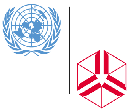
network of research and training centres and programmes
Issue 20: October 2002
 |
UNU Update | |
| The newsletter of United Nations
University and its network of research and training centres and programmes |
||
|
Issue 20: October 2002 |
||
|
UNU initiates campaign to put sustainable development in the world's classrooms There is a need to integrate a sustainable development focus into the curriculum at every level of education, starting in primary school. So states a Declaration issued at the recent World Summit on Sustainable Development by 11 of the world’s foremost global educational organizations and scientific academies. The
Ubuntu Declaration says greater global emphasis on education is essential
to reaching sustainable development goals, and creates a major global
alliance to promote science and technology courses and teaching throughout
educational systems worldwide. The Declaration was issued at the Johannesburg Summit by:
The goals of the effort are:
Hans van Ginkel, UNU Rector and President of the International Association of Universities, said additional members will be sought for the alliance of policy makers, educators, professionals and researchers at international academies of science and institutions of higher education. "Sustainable
development is not a one-day tutorial," he emphasized. "Education
means much more than simply pre-employment training. Integrating
sustainable development into the curriculum at all education levels and
sectors is needed to ensure that students from primary to post-secondary
are aware of its imperatives and respect its principles and values in
their professions and as habits of everyday life." Walter Erdelen, UNESCO Assistant Director-General for Natural Sciences, said the alliance also looks to education ministries at the national level to reevaluate and relate school programs to sustainable development, and to ensure the appropriate training and retraining of teachers. "This
effort helps to respond to the critical necessity to resolve tension
between growth and development, on the one hand, and conservation and
environmental protection on the other," he added. "Expanding the
educational base, and in particular the scientific-technological base, is
also essential for reversing the growing inequity among nations." Also
participating in the announcement were Mohamed Hassan, Executive Director,
Third World Academy of Sciences; Dato Lee Yee
Cheong, President-elect, World Federation of Engineering Organizations;
Thomas Rosswall, Executive Director, International Council for Science;
and Richard Clugston, President, University Leaders for a Sustainable
Future. |
|
Copyright © 2002 United Nations University. All rights reserved. |